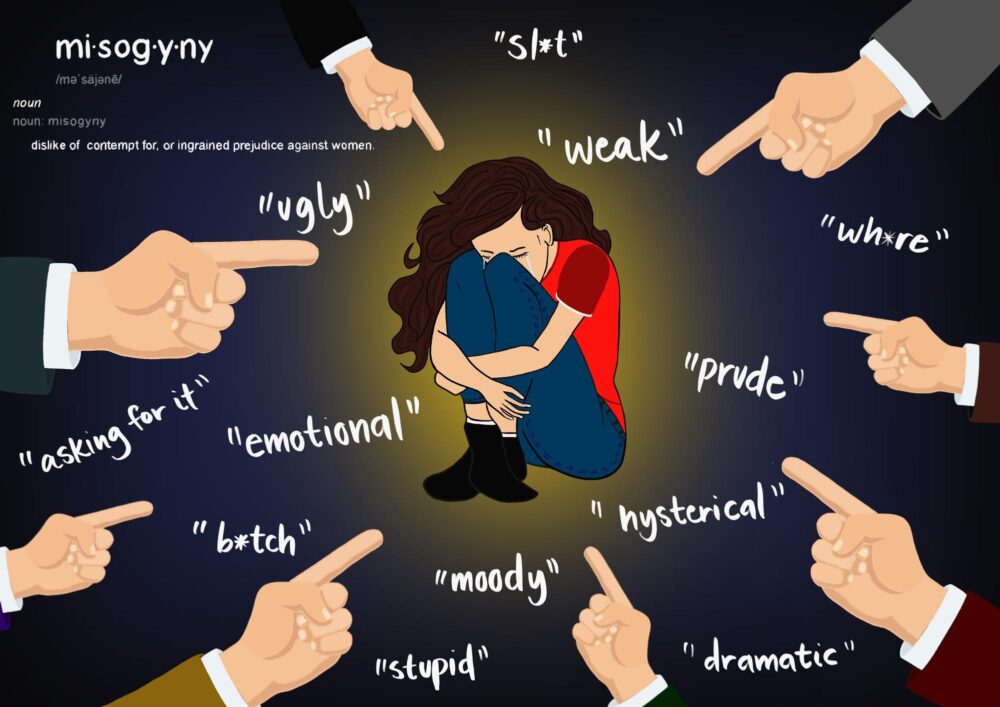
By Emily Doan
According to the National Sexual Violence Resource Center (NSVRC), 56% of girls from 7-12th grade have experienced some form of sexual harassment. One in every 4 girls has been sexually abused before reaching the age of 18.
There is an undeniable culture of degradation and dehumanization of women, so much so that the leading culprits wouldn’t even be able to tell you what they did wrong. And while it may be easier to believe “NotAllMen,” denying the reality of our society is no less harmful than the misogynistic behavior itself. We live in a society that’s more concerned with the well-being of the oppressor than the oppressed, that blames the victim before believing.
Objectification isn’t limited to one type of experience and it is not, and never will, be a compliment. The people resisting that type of behavior aren’t “jealous” or “mad” that they didn’t receive that level of disgusting attention. Women are sick and tired of being told that being harassed is just part of life. That being assaulted is inevitable. That being raped is not only out of the control of those with the power but somehow at our own fault.
People often try and write off misogyny as a way of life. It is a sad truth to say that most women have a story about catcalling, verbal or physical harassment, slut-shaming, gender-based discrimination and more.
“Boys will be boys,” as they say. But just because our society is so quick to embrace a widely sexist and misogynistic culture does not mean it is right or just. When we accept misogyny, we are telling girls that their feelings and experiences aren’t valid, and in turn legitimize the oppressor’s way of life.
“I’ve experienced [misogyny] first hand when being told I should have kids because that’s what I’m ‘made for.’ I feel extremely offended when people act like they can make decisions for me … It shows that while we have made immense progression in our culture, we still have much to fix,” junior Elea Vander Burgh said.
Sexism and misogyny isn’t something that just appears—it’s taught. Young girls are told that their very appearances are more important than their education. The idea that wearing a certain article of clothing is “too distracting” or “not appropriate” for one gender or needing to have a certain body type to be desirable are just some examples of the culture that we have been raised in. We see girls, having been beaten down with this ideology their whole lives, starting to conform to the standards being set out by men.
The truth is, a person’s value doesn’t come from their appearance. It doesn’t come from their reputation, their clothes, their actions or their words. People often try to belittle women for being too this or too that, not skinny enough, not compliant enough, not whole enough. We need to realize, our wholeness doesn’t come from anything besides ourselves. Our worth can’t be measured on a scale; it’s not something that can be extinguished, no matter how many people try and tell us otherwise.
By letting these small, ignorant misogynists tell us that our worth is based solely on their opinions, we’re not only allowing them to spread these repulsive lies, but we’re also encouraging them to carry on.
“There are a lot of people who are afraid to speak up—too afraid to educate, because maybe in doing so you might lose the respect of someone you’re close to … The silence of a bystander who sits and watches is only another message that this behavior is okay. It makes you a part of the problem that shouldn’t be existing in the first place,” senior Angela Nguyen said. “So if you see something, don’t be afraid to say something. It does make a difference.”
When we say “MeToo” or “My Body, My Choice,” we are not being hysterical or dramatic. For too long, society has taken away our right to say no without being dismissed. We are fighting for the trauma that so many women have felt, so many women feel to be recognized. It shouldn’t matter that we are someone’s sisters or daughters. We deserve to be treated as human beings with minds and voices. There are no exceptions.





